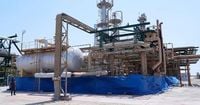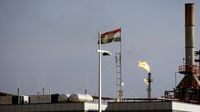Negotiations to resume oil exports from the Kurdistan Region of Iraq through the Turkish pipeline are facing significant hurdles due to ongoing uncertainties surrounding payments and contracts. The Kurdistan Oil Industry Association, known as "Apex," which comprises eight oil companies operating in the region, announced that it will not recommence exports until Baghdad provides a firm commitment to honor existing contracts and guarantees payment for previous and future shipments.
This stalemate has resulted in a two-year suspension of crude oil flow from Kurdistan to the Turkish port of Ceyhan on the Mediterranean Sea. In a statement released on February 23, 2025, the Iraqi Ministry of Oil confirmed that all export procedures through the Ceyhan port had been completed, in line with the allocations set forth in the budget law and within Iraq's production ceiling as determined by OPEC.
The Ministry has called for an expanded meeting with oil companies operating in the region to discuss the technical and logistical challenges necessary for resuming export operations. However, these companies insist on receiving their financial dues upfront, a condition that the federal government has rejected, preferring to settle all financial matters first.
Sources indicate that a U.S. diplomat was scheduled to attend a meeting in Baghdad aimed at discussing the resumption of oil exports from the Kurdistan Region through the Ceyhan pipeline. This meeting comes as Washington exerts pressure to restart these exports. Reports from Reuters in March 2025 revealed that Iraq is facing increasing American pressure to allow the export of oil from the Kurdistan Region via Turkey, which would subsequently boost supplies to global markets. This move is part of U.S. efforts to reduce Iranian oil exports as part of its strategy to curb Tehran's nuclear program.
The ongoing disputes have left many in the oil industry concerned about the future of Kurdish oil exports. The Apex association's stance highlights the deep-seated issues surrounding financial guarantees and contract compliance, which have been a point of contention between the Kurdistan Regional Government (KRG) and the federal government in Baghdad.
As the situation develops, the implications for both the local economy in Kurdistan and the broader global oil market remain significant. The Kurdistan Region has long relied on oil exports as a primary source of revenue, and the continued suspension of these exports could exacerbate economic challenges faced by the region.
Industry experts suggest that without a resolution, both the KRG and Baghdad risk losing out on valuable revenue streams that could benefit both parties. The stakes are high, as the global demand for oil continues to fluctuate, and the geopolitical landscape remains complex.
In summary, the negotiations to restart oil exports from the Kurdistan Region through Turkey are at a critical juncture. The need for clear commitments from Baghdad regarding financial payments and contract adherence is paramount for the resumption of operations. As discussions continue, the impact on the region's economy and the global oil supply chain is closely watched by stakeholders worldwide.




